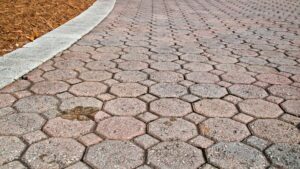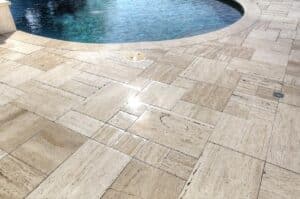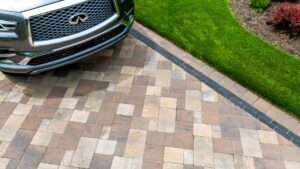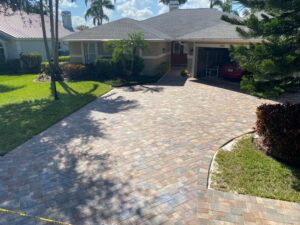Pavers are a popular choice for outdoor surfaces like driveways, patios, and walkways due to their durability and aesthetic appeal. However, over time, they can accumulate dirt, grime, and even weed growth between the joints – making them look less than their best. So can you pressure wash pavers?
Many homeowners ask themselves such a question – and in this article, we’ll explore the benefits and potential risks of pressure washing pavers, along with some best practices to ensure your pavers remain in excellent condition.
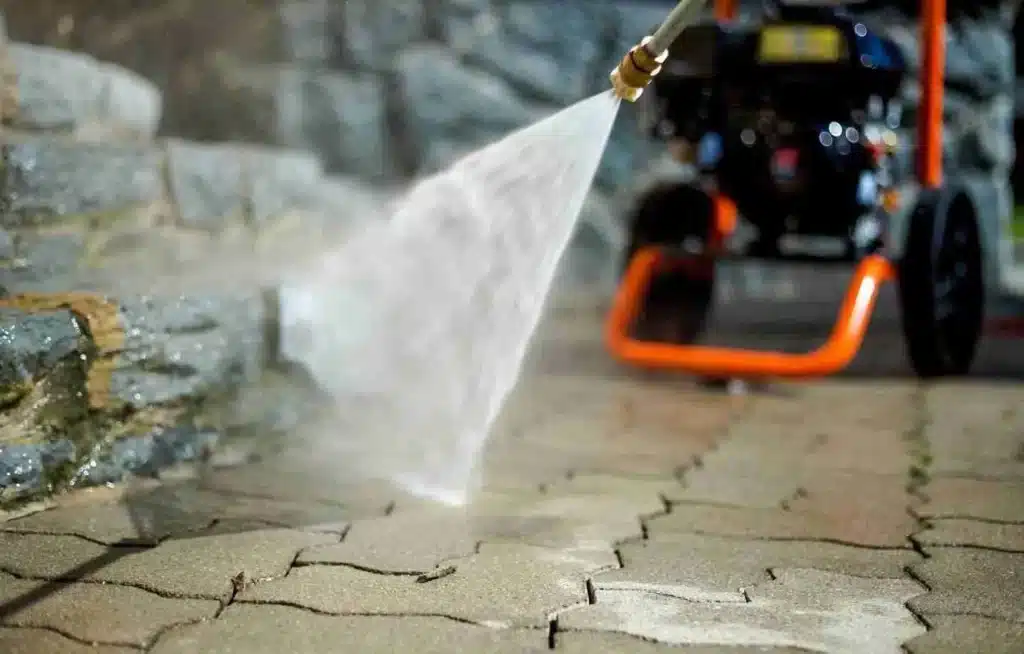
Can you pressure wash pavers?
Yes, you can pressure wash pavers. However, the cleaning process needs to be handled carefully.
Pressure washing is undeniably effective in removing dirt, stains, algae, moss, and other unsightly elements from the surface of pavers. It can restore the original look of your outdoor space. Compared to manual cleaning methods, pressure washing can save you a significant amount of time and effort, which is particularly important if you have a large paver area to clean.
But the biggest concern revolves around the adjustment of pressure.
Excessive pressure can damage pavers, particularly if they are made of softer materials like clay or some types of natural stone. High-pressure settings may erode the surface, causing cracks, chips, or uneven wear.
Overusing pressure can also dislodge joint sand, which is necessary for stabilizing the pavers and preventing weed growth – this could result in uneven paver alignment and the need for re-sanding.
Therefore, you need to take extreme care and know exactly what you’re doing when pressure washing pavers. But don’t worry, we will teach you how to do it step-by-step.
How to pressure wash pavers
Choose the right equipment
Choosing the appropriate pressure washer is a fundamental step in effectively cleaning pavers.
Opt for a pressure washer with adjustable pressure settings, as this will give you better control over the cleaning process. For pavers, it’s generally recommended to operate at a pressure range of 1,500 to 2,500 psi.
Always begin with the lowest pressure setting and only increase it if necessary. This approach minimizes the risk of paver damage during the cleaning process.
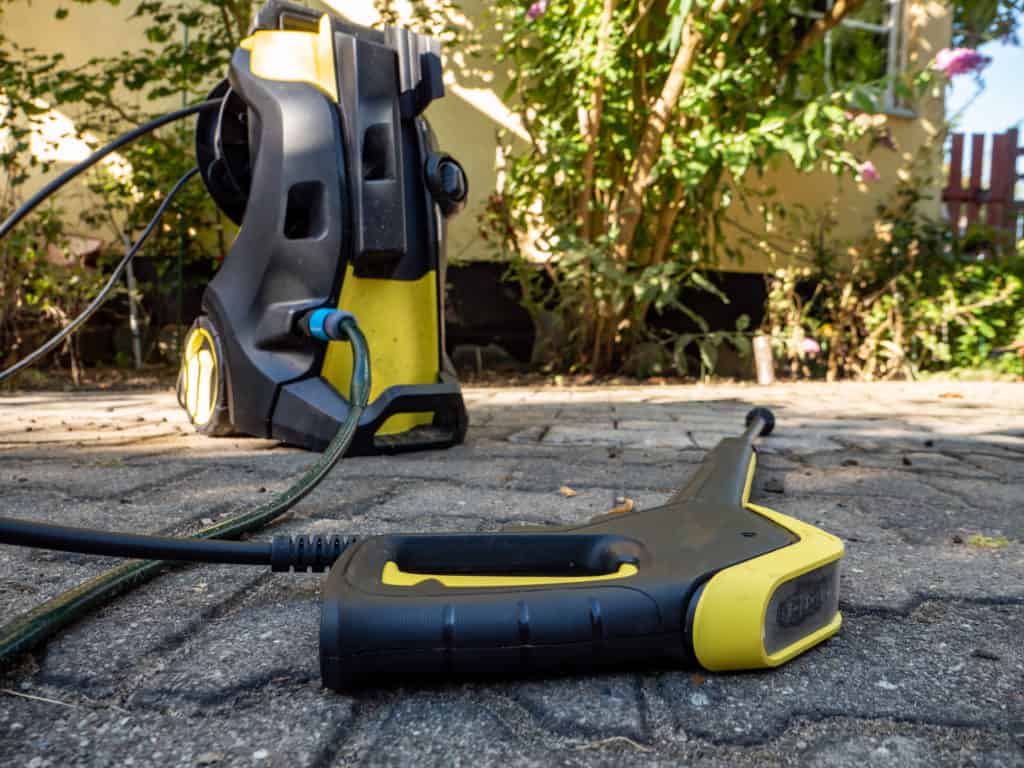
Keep a safe distance
When using a pressure washer on pavers, maintain a safe distance between the nozzle and the surface. Keeping a safe distance, typically around 12 to 18 inches, minimizes the risk of damaging the pavers. Being too close can cause pitting, etching, or even dislodging of the paver surface.
Test in a small area first
Before you start pressure washing the entire paver area, it’s wise to conduct a test in an inconspicuous corner or small section. This test ensures that the pressure washer won’t cause any harm or leave unwanted marks on your pavers. If you observe any issues during the test, it’s a sign that adjustments may be needed.
Use proper technique
Employing the correct technique is crucial to prevent damage and ensure a thorough cleaning. For this, hold the pressure washer nozzle at a slight angle rather than directing the spray directly into the joints between the pavers. This prevents the force of the water from eroding the joint sand, which helps maintain the stability and structure of the pavers.
Post cleaning maintenance
After pressure washing, carefully inspect the joint sand between the pavers. The cleaning process may dislodge or wash away some of the sand.
It’s important to replace any lost or eroded joint sand to maintain the stability and interlocking mechanism of the pavers – this will also prevent weed growth between the pavers. Consider also applying a sealer to the pavers after cleaning. Sealing the pavers offers several benefits, including protection against future stains and making them easier to clean in the future.
Sealers act as a barrier against oil, dirt, and other contaminants, preserving the pavers’ appearance and durability. Be sure to select a sealer appropriate for your specific type of pavers and follow the manufacturer’s instructions for application.
Read as well: The best tips for pressure washing pavers
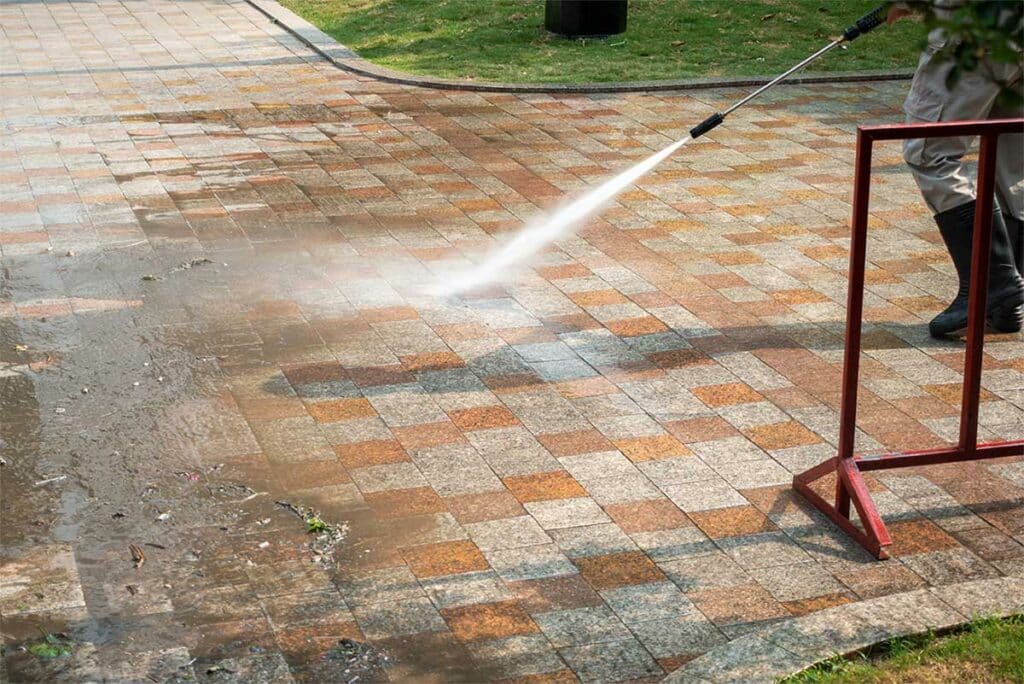
Professional cleaning
As you can see, pressure-washing pavers can be an effective and efficient method for cleaning and restoring the beauty of your outdoor spaces. However, it should be done with caution, using the right equipment and techniques to avoid damage.
If you’re unsure about pressure washing your pavers, always consider hiring a professional who can assess your specific situation and provide expert guidance and service.
When done correctly, pressure washing can bring new life to your pavers, enhancing the overall aesthetics of your outdoor area. But we here at S&S Pavers have seen many situations where homeowners have inadvertently damaged their pavers while pressure washing them.
So if you’re not sure you can handle it, look for a professional hardscape contractor you can trust around your area to offer you professional cleaning services. If you happen to be around our area of activity, the Sarasota and Manatee counties, in FL, you can always contact us to provide that help for you!

